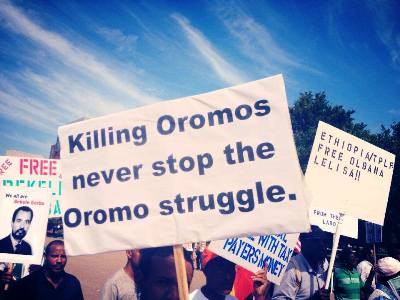Death toll in Ethiopia’s Oromia protest reaches 75

At least 75 people have so been killed during the weeks of protests that are taking place in Ethiopia’s Oromia region against the Ethiopian capital, Addis Ababa’s expansion plan, Human Rights Watch said Saturday.
Since last month, students from Ethiopia’s largest ethnic group, Oromo, have been protesting against the controversial “Addis Ababa Integrated Development Master Plan” proposed by the central government to expand Addis Ababa to parts of Oromia region.
The majority of those protesting have argues that the expansion plan will lead to large scale evictions of several farmers from their ancestral lands.
They also fear their land will be grabbed without appropriate compensation.
Presently, an estimated two million people, mostly farmers live in the Oromia region areas that have proposed by the government for expansion.
Hundreds of farmers have also joined the protest, which continues in larger parts of the region amid fears it could spread to other parts of the country.
The Ethiopian government has earlier acknowledged that only five of the protesters were killed following the ongoing clashes with security forces since began on 12 November in western Oromia regional state, but the rights body says 75 people died.
“Police and military forces have fired on demonstrations, killing at least 75 protesters and wounding many others, according to activists”, is said.
According to Human Rights Watch, the Ethiopian government on December 15 announced that the protesters had a “direct connection with forces that have taken missions from foreign terrorist groups” and that Ethiopia’s Anti-Terrorism Task Force would lead the response.
“The Ethiopian government’s response to the Oromia protests has resulted in scores dead and a rapidly rising risk of greater bloodshed,” said Leslie Lefkow, the deputy Africa director at Human Rights Watch.
It accused Ethiopian security forces of using excessive lethal force.
“While police have the responsibility to maintain order during protests, they should only use force when strictly necessary and in a proportionate manner”, it said, calling for freedom of expression and peaceful assembly.
The human rights group further urged authorities in Ethiopia to support prompt, independent investigations into the events in Oromia region, including by the United Nations and African Union (AU) human rights experts on freedom of expression, peaceful assembly and association.
Governments and intergovernmental organizations, including the AU, should raise concerns about the excessive use of force against protesters and call on Ethiopia to respect fundamental human rights in its response to the protests, the rights entity said.
“Ethiopia’s security forces seem to have learned nothing from last year’s protests, and, instead of trying to address the grievances that are catalyzing the protests, are shooting down more protesters,” said Lefkow.
He added, “Concerned governments and institutions should call on Ethiopia to halt its excessive use of force and stop this spiral into further violence”.
The government accuses some of the protesters of having links with some anti-peace forces including with Ginbot-7, an exiled opposition movement which had long been designated by Addis Ababa as a terrorist entity.
“The government’s labeling of largely peaceful protesters as ‘terrorists’ and deploying military forces is a very dangerous escalation of this volatile situation,” stressed Lefkow.
Meanwhile, Ethiopian police said Friday that it seized from Addis Ababa bus station weapons which were being transported to unspecified place.
Last week, Ethiopian security forces detained 10 members of Ginbot-7 who they claimed were allegedly deployed by arch-rival Eritrea to carryout terrorist attacks on the public and government development institutions.
They were arrested some few days before a hand grenade attack at Ethiopia’s biggest mosque in the capital last week left 24 people wounded.
St